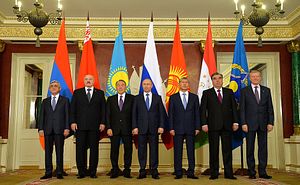At a gathering in Moscow, the presidents of the Collective Security Treaty Organization (CSTO) member countries laid out the group’s top priorities. In a surprise to none, combating the Islamic State and other extremist groups topped the list. The regional military alliance includes Armenia, Belarus, Kazakhstan, Kyrgyzstan, Russia, and Tajikistan.
The group of leaders last gathered in September in Dushanbe, Tajikistan, where they focused the discussion on the Islamic State and fragility in Afghanistan. The insecurity in Afghanistan is often linked by Central Asian governments to an impending threat from the Islamic State. Of the CSTO members, however, only Tajikistan borders Afghanistan.
A joint statement from the group Monday said, “We see as a priority task the decisive fight against the ISIL (Islamic State of Iraq and the Levant — former name of IS) terrorist group that has unleashed cruel bloodshed in many countries and presents a threat to the entire humanity.” The statement went on to note “the growth of security threats in Central Asia connected with activities of ISIL, the Taliban movement, Al-Qaeda and other terrorist organizations on the territory of Afghanistan which leads to escalation of tensions on CSTO’s southern borders, directly threatening with destabilization of the situation in the area of its (CSTO’s) responsibility.”
According to TASS, the member countries also “called for forming a broad coalition on the basis of UN Charter, norms and principles of international law without politicizing and preconditions.” The mention of “preconditions” may be a reference to Western statements that Syrian President Bashar al-Assad must step down in order for the Syrian conflict to move toward a resolution. Assad is a Russian ally and while Moscow says its airstrikes in Syria have targeted the Islamic State, observers say the Russian jets are more often striking anti-Assad rebels. In October, Reuters reported that 80 percent of Russian airstrikes weren’t hitting Islamic State positions.
Asia-Plus reports that during the CSTO meeting, Tajik President Emomali Rahmon delivered a statement saying that “the most dangerous factor for CS[T]O member nations is participation of some of our citizens in armed conflicts in the region.” He also highlighted the importance of information sharing and disrupting recruiters.
Ahead of the meeting, RFE/RL reported that Yury Ushakov, an advisor to Russian President Vladimir Putin, had said that in addition to a statement on combating terrorism the CSTO would discuss choosing a successor for its current head, Secretary-General Nikolai Bordyuzha. However, a successor was not chosen and the group decided, unanimously according to the Belarusian state press agency BelTA, to extend his tenure to 2017. As Joshua Kucera points out on Eurasianet, Bordyuzha, who has served as the CSTO’s secretary general since 2003, has been the group’s only secretary general.

































